Ceffers to the Editor
MALAYA AND THE ENGLISH PRESS
SIR,—In spite of its immense economic impor- tance as a dollar-earner for the whole Com- monwealth and its vital strategic position in South-East Asia, Malaya has for years re- ceived most inadequate coverage" in the English Press. Not only has little attempt been made to tell the truth about events in that country, but unfair comment and bias based on a bad appreciation of the situation have appeared from time to time in the home newspapers.
The latest and best example of inadequate and indeed inaccurate treatment of Malayan affairs is contained in a recent article in The Times from its correspondent on the spot, entitled 'Stalemate in Malaya "—of which the sub-title of the second part reads " Popular Resentment of British Attitude." It is obvious that the writer has sought his inspiration almost exclusively from the frustrated intellec- tual. This type has been a growing problem in Asia since Western education first produced its tale of " failed B.A.s." He is, of course, a part of the population which cannot be ignored and a problem which cannot be brushed aside by the methods of "Colonel Blimp "; but he is in a minority, and there are thousands of intelligent Asian intellectuals who are not frustrated, and whose opinions most certainly demand a hearing.
The impression left on the mind from reading what The Times correspondent has to say is that the Communist war is being direc- ted in Malaya exclusively by a narrow oligarchy and an exclusive Civil. Service, which give no parts in the drama to educated Asians to play. In the background lurks the canard of the " whisky-swilling planter," which was invented way back in the middle of the war as a partial excuse for the disasters of the Malayan Campaign. The inference is that a majority of the people resent the British attitude and are opposed to it. On this general point it is sufficient to say that if a majority of the local population had been "Agin the Government "—even without being active supporters of -the Communists—the struggle would have been lost years ago.
The truth is that a tiny minority of the people actively support the terrorists—many of these under compulsion—a larger minority backs up the Government in its campaign, while the majority have sat on the fence awaiting the outcome and ready to drop down on either side. But the all-important fact is that the fence-sitters grow progressively fewer as numbers join the Anti-Communist Crusade. Therein lies the principal, perhaps the only, hope for the future.
The Malayan Civil Service is not an exclu- sively European preserve. Entry into it has been open to Malays of the requisite calibre and educational standards for many years. It is true that only recently has entry to the higher ranks of the service been granted to other Asians, and as yet on a restricted scale. This restriction has hitherto been at the ex- press wish of the Rulers of the Malay States; it is now being modified and enlarged pani passer with the new policy of giving full rights of citizenship to persons other than Malays, Who are settled in the country and acknow- ledge it to be the object of their loyalty.
Perhaps the strongest criticism of The Times article is that it makes no mention of the many-
progressive achievements in Malaya during the past five years, undertaken by the Govern- fnent or under its auspices. Many of these undertakings have been essentially part and parcel of the struggle against Communism, but others of a more general nature have been reached in spite of Communism and point the way to the gradual attainment of self- government.
What omissions these are ! The only men- tion of the Home Guard is half a line giving their numerical strength. There is no endeavour to assess the great effect of this organisation on the morale and esprit de corps of the people, apart from its purely physical result in increasing the size of the police forces. There is no mention of the new Village Councils, springing up everywhere with considerable powers of local self-government and elected on a very democratic basis. Nor is there a hint of the institution of the member system as a prelude to cabinet government; nor of the gradual introduction of democratic elections in stages, beginning with town councils. The proposed revolu- tionary changes in education with the intro- duction of national schools, and the big extension of citizenship rights are likewise ignored. . . . One could go on quoting more examples of omissions of substance—to the increasing weariness of one's readers.
The underlying fault is not so much a conscious suppression of truth, as that it seems almost impossible to tell a sufficient part of the whole truth to give a fair picture of the real state of affairs.
Why should this be so ? Perhaps because individual writers have had political axes to grind, or that their views are subjectively coloured by their own beliefs and aspirations. And in this connection it has to be recognised that Malaya is not a sympathetic study to your " pink " intellectual, because it has pro- gressed as yet a comparatively short way along the democratic road, and because it is rather obviously a " capitalist " country. But the Conservative Press should not mind this, so perhaps another reason is that correspondents simply do not know the whole truth. That means that they have not gone forth to seek it.—Yours faithfully,
































 Previous page
Previous page